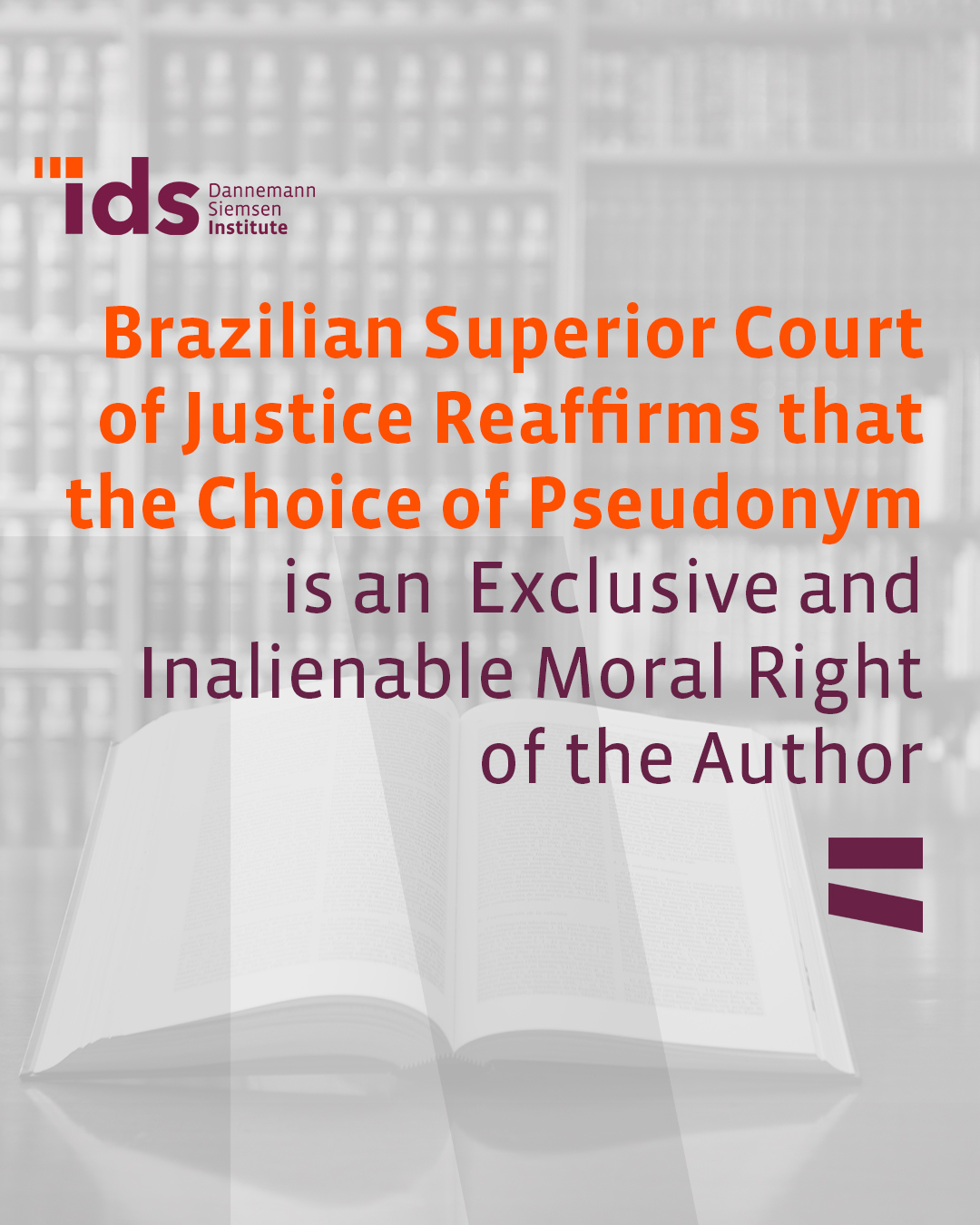21 de outubro de 2025
Share
Brazilian Superior Court of Justice Reaffirms that the Choice of Pseudonym is an Exclusive and Inalienable Moral Right of the Author
On October 7, 2025, the Third Panel of the Superior Court of Justice (STJ) unanimously held that the prerogative to choose a pseudonym belongs exclusively to the author and cannot be transferred to third parties. In judging Special Appeal No. 2,219,796 – PE, reported by Minister Ricardo Villas Bôas Cueva, the Court reaffirmed the principle established by Law No. 9,610/98 (Brazilian Copyright Law – LDA) that the choice of a pseudonym constitutes a personal, inalienable, and non-waivable moral right. The Court rejected the appeal filed by a publishing company, clarifying that, although the contract could provide for the use of a fictitious name, such a clause could not override the legal protection of moral rights.
The case originated when an author, contracted to prepare and write a biology textbook, filed a lawsuit after the work was published without his authorization and without proper authorship attribution. The publisher released the book without prior notice, omitting both the author’s name and the pseudonym he intended to use, and instead opted to include fictitious names created by the company. The author argued that the substitution of his name with unauthorized pseudonyms deprived him of intellectual and academic recognition for the work.
Both the trial court and the Court of Justice of Pernambuco (TJPE) recognized the publisher’s unlawful conduct, ordering compensation for both material and moral damages. The TJPE emphasized that the author’s right to have his name or pseudonym indicated is inalienable under Article 27 of the Copyright Law, rendering null any contractual clauses that provided for its transfer, and that publishing the work under pseudonyms not chosen by the author constituted fraud, warranting the application of Article 103 of the same law.
In the special appeal, the appellant argued for the validity of the contract, asserting that it constituted a legally binding act grounded in the principles of autonomy of will and objective good faith. The publisher contended that no assignment of moral rights occurred, as the contract did not provide for the transfer of the author’s name, which remains inalienable by its nature. According to the company, the contract merely authorized the use of a fictitious name or pseudonym for publication, which, in its view, did not violate the author’s moral rights. The publisher further argued that this provision should be interpreted as a procedural matter, distinct from the assignment of moral rights, and that it did not affect the author’s moral integrity, being solely a contractual decision regarding the name to be used.
The STJ, however, fully rejected the publisher’s arguments, clarifying that the issue does not concern the validity of the contract but rather the legal limits imposed on copyright. The Court confirmed that the choice of a pseudonym is an exclusive moral prerogative of the author and reaffirmed the distinction between economic rights, which may be assigned, and moral rights, which are personal, inalienable, and non-waivable under Articles 27 and 49, I, of Law No. 9,610/98. The Court also emphasized that legal transactions involving copyright must be interpreted restrictively (Article 4 of the LDA), prohibiting the assignment of moral rights, and concluded that the publisher acted unlawfully by violating this limit.
The reporting minister highlighted that the right to have one’s name, pseudonym, or conventional mark associated with the work constitutes a fundamental moral prerogative of the author, expressly guaranteed by Article 24, II, of the Copyright Law. In the case of pseudonymous works, it is solely for the author to decide whether to identify himself or conceal his identity and to choose the pseudonym to be used. By allowing the publisher to unilaterally determine the pseudonyms, the contract exceeded the limits established by law and directly violated the author’s moral autonomy.
With the appeal partially considered and dismissed, the decision of the TJPE was fully upheld, confirming the obligation to compensate the author for the damages suffered. The STJ’s judgment establishes an important precedent, reaffirming that the choice of a pseudonym is an expression of the author’s creative identity and a moral right protected under Brazilian law. The decision reinforces that no contract can override the inalienable nature of these rights.
The full text of Special Appeal No. 2,219,796 is available at: Electronic Judgment
Note: For quick release, this English version is provided by automated translation without human review.
